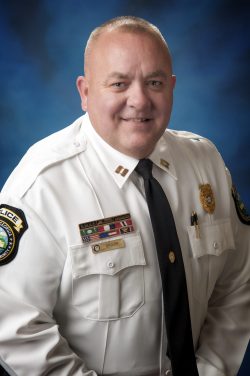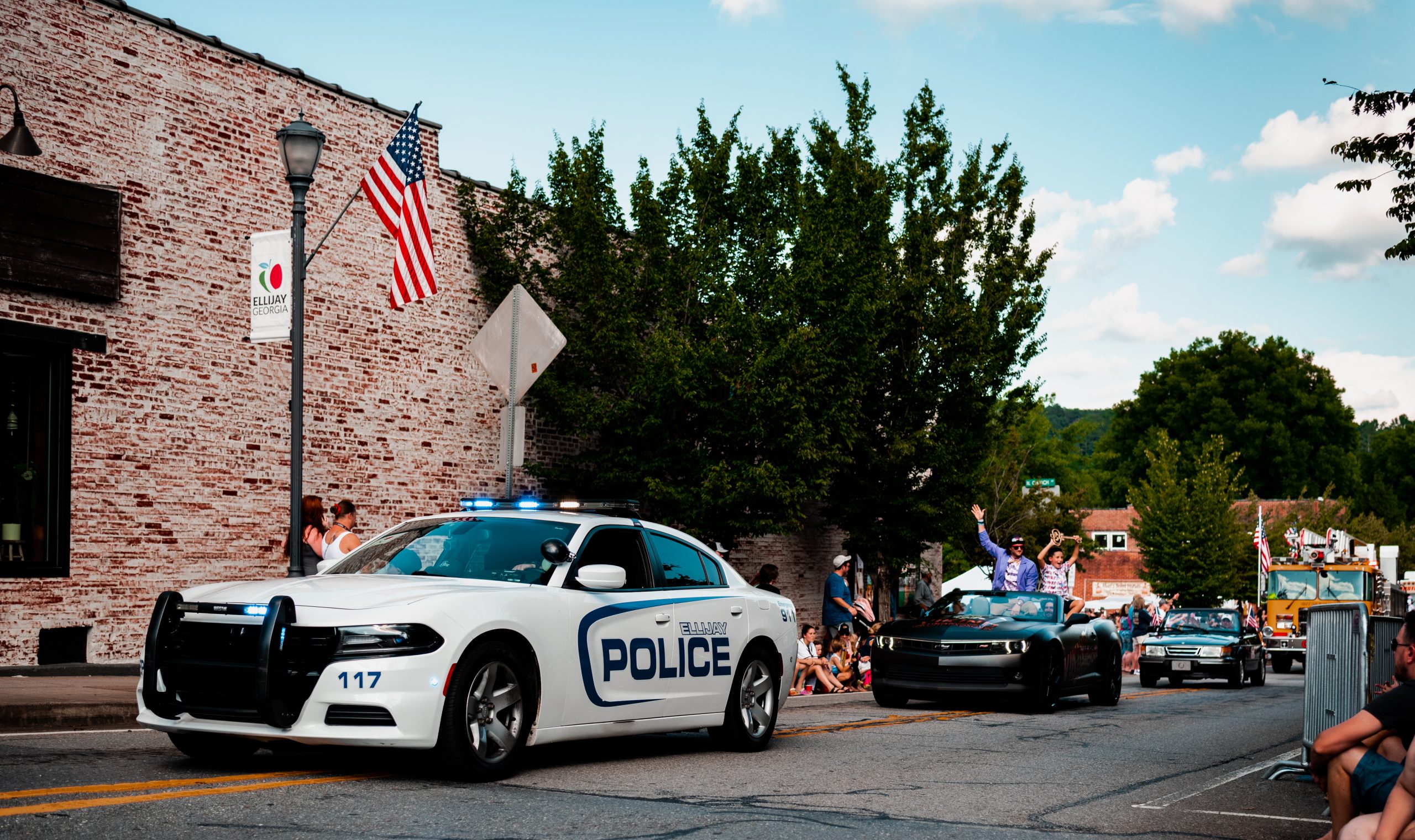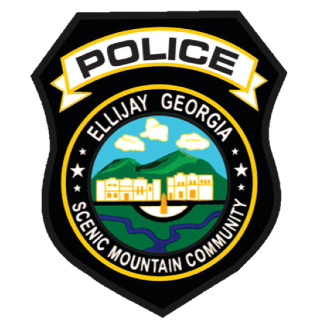Ellijay Police
The Ellijay Police Department
Our mission is to enhance the quality of life in the City of Ellijay by working cooperatively with the public and within the framework of the Constitutions of the United States and the State of Georgia to enforce laws, prevent and detect crime, preserve the peace, reduce fear, and anticipate and respond to events that threaten public order and the preservation of life and property.

197 North Main Street
Ellijay, Georgia 30540
Chief Edward Lacey is a Gilmer County native and graduate of Gilmer High School. He began his law enforcement career in 1990 as a detention officer of the Cherokee Sheriff’s Office. He retired from CSO in December of 2012 with the rank of Major and became the Chief of Ellijay PD on January 1, 2013.
Chief Lacey holds a bachelor’s degree in criminal justice from North Georgia College (now UNG), a Master of Public Administration from Columbus State University, as well as Advanced, Supervisory, Managerial, and Executive Certifications from Ga. POST. He is a graduate of the Georgia Law Enforcement Command College Class V and Session #201 of the FBI National Academy in Quantico Va.

Captain Ray Grace
Assistant Chief of Police
Captain Ray Grace became Assistant Chief of Police in July of 2015. Captain Grace began his law enforcement career in 1995 as a reserve deputy with the Cherokee Sheriff’s Office. He was soon employed by the Canton Police Department as a patrol officer and rose to the rank of sergeant. As a deputy with the Pickens County Sheriff’s Office, he attained the rank of Lieutenant. In his career he served as a patrol officer, undercover narcotics officer, shift supervisor, and training officer.
As the EPD Assistant Chief of Police he serves as operations officer. He is graduate of the State of Georgia’s Professional Management Program as well as the Ga. POST Chief Executive’s Course. He holds both Advanced Peace Officer Certification and Supervisory Certificate.

CORE VALUES
PROFESSIONALISM: The Ellijay Police Department will provide quality service to our community and assist other agencies to the best of our ability. We will fulfill our mission by being accountable to our community, our department, and to one another. We will keep ourselves physically and mentally fit to accomplish our mission. We will not allow personal bias or emotion to affect our decisions and actions. We will embrace the recognized standards for our profession and uphold them with enthusiasm.
RESPECT: The Ellijay Police Department believes that respect is the basis by which we protect human dignity. We operate in a spirit of cooperation and we model this behavior starting with each other. Respect is due to all regardless of race, creed, color, gender, religion, position or socioeconomic standing. We are committed to fighting to protect the rights and liberties of all people afforded to them by their Creator, the Constitution of the United States and the State of Georgia. We commit ourselves to the motto: “Service before Self”.
INTEGRITY: The Ellijay Police Department believes that Integrity is character in action and it is the standard which guides all we do. We are morally and ethically aware, resolute, and above reproach at all times regardless of our duty status. Our actions will match our words and we will have the courage to stand up for our beliefs and at all times strive to do the right thing even when no one is looking.

DEDICATION: Every member of the Ellijay Police Department is dedicated to their family, the organization, and the citizens we serve. We are dedicated to working in partnerships with the community, with other law enforcement agencies and with each other to reduce crime, enhance customer service, and improve quality of life. We dedicate ourselves to our Core Values, to our Mission, to the Law Enforcement Code of Ethics, and to our Oath of Office.
EMPATHY: The Ellijay Police Department seeks to inspire with courage, spirit and confidence all those we encounter. We strive to be aware of and sensitive to the emotions others may have due to their current circumstances. We will serve our community by seeking every opportunity to provide aid, assistance, comfort, relief and advocacy. We will remain ever vigilant to our personal attitude and will commit to keep ourselves mentally, physically, and spiritually prepared to the higher calling which we have answered. We will execute our mission in an intentional manner keeping true to our Core Values.

We are committed to fairness, compassion, and excellence; providing police services in accordance with the law, while being sensitive to the needs of the public we serve. We are committed to community partnerships through which we can address crime and public safety concerns. As such, it is my sincere wish that you will partner with us to accomplish these same goals.
Throughout my career in law enforcement, I have maintained my residence in Gilmer County as well as my close community ties to Ellijay with the hopes of someday returning to serve the community I love. The Ellijay Police Department has a long-standing order to “work extremely hard toward providing 21st century services while maintaining the “small town” feel that makes Ellijay so appealing. We will continue to do this in the future.
Our agency has taken great strides this year to increase our professionalism and accountability to the public. This website is just another way the City of Ellijay Police Department seeks to serve its citizens.
We remain open to you and encourage public feedback. Any unanswered questions, comments or complaints can be emailed to me directly by completing the form below. I will review every message and ensure immediate action is taken to address your concerns.
The contact numbers for the Police Department are 706-635-7430 and fax 706-635-7457.
Thank you for visiting our site and thank you for your commitment to keep Ellijay a mountain experience for you and your family that you will fondly remember.

Employment
The Ellijay Police Department will accept applications at all times, regardless of whether the agency is currently hiring. When the agency begins a hiring process, the announcement will be made public on this web page.
FAQs
General Information
Whenever an incident report is filed, the report is then passed on for supervisor review and approval. During this part of the process, the incident is evaluated to determine what follow‐up action is required. If the circumstances of a particular case warrant, the case will be forwarded to a detective for follow‐up investigation. If your case does require follow‐up investigation, a detective will usually contact you within 48 – 72 hours after filing of the initial report. The detective might speak with you only by phone or may need to set up a meeting with you, for the purpose of obtaining additional information. In most instances, the detective that contacts you will be handling your case and he will provide you with a case number. If you should come up with any additional information or have a change of address or phone number, please be certain to pass this information on to us
General Information
Whenever an incident report is filed, the report is then passed on for supervisor review and approval. During this part of the process, the incident is evaluated to determine what follow‐up action is required. If the circumstances of a particular case warrant, the case will be forwarded to a detective for follow‐up investigation. If your case does require follow‐up investigation, a detective will usually contact you within 48 – 72 hours after filing of the initial report. The detective might speak with you only by phone or may need to set up a meeting with you, for the purpose of obtaining additional information. In most instances, the detective that contacts you will be handling your case and he will provide you with a case number. If you should come up with any additional information or have a change of address or phone number, please be certain to pass this information on to us
I received a citation. What do I do?
Your citation has some valuable information contained upon the copy provided to you. First, make note of the Agency issuing the citation. Second, make note of the name of
the court at the bottom of the citation. If the issuing department is the Georgia State Patrol OR the City of Ellijay Police Department AND the court is listed as the Municipal Court of the City of Ellijay, then you can follow these instructions:
PAY CITATION ONLINE: Anyone wishing to pay citations online using a credit card may visit: https://ellijayga.governmentwindow.com/ticket.html Enter your Citation Number (which is located at the top right corner of the citation) or you may search by entering your Driver’s License Number, then click the green “Find” button and follow the instructions.
PAY CITATION BY PHONE: Citations may be paid over the phone at (844) 324‐8816.
PAY CITATION IN PERSON: Most citations may be paid prior to your court date. To find out what your fine may be contact the Ellijay City Court at 706‐635‐4711 extension “5”
If you do not admit fault for the citation, make sure you come to court on the date/time listed on your citation. The judge will call the court calendar and ask you to enter a plea of Guilty or Not Guilty. Many times you may ask to talk to the Solicitor if you want the court to consider any special circumstances. If you enter a Not Guilty Plea, the trial may be had immediately OR it may be postponed a month (this is upto the Judge).
Where do I call to report a crime, accident, or suspicious activity?
The answer to this is – it depends. If there is any situation that demands immediate response, call 911. If the incident has already occurred, you may report that either by using dispatch (706‐635‐8911) or by contacting the EPD police during office hours either over the phone (706‐635‐7431) or in person (195 N. Main Street, Ellijay, Ga).
Jurisdiction in Gilmer County can be very confusing, and reports for police service must be made in the proper jurisdiction. Not every incident with an “Ellijay” postal address is within the corporate city limits of Ellijay; they may be in East Ellijay (East Ellijay Police Department) or unincorporated Gilmer County (Sheriff’s Office).
Since all police services in the county are dispatched through a unified center managed by the Gilmer Sheriff’s Office (open 24/7/365), the easiest and best way to speak to the most appropriate police officer is to call the non‐emergency number for dispatch (706‐635‐8911). They will ask a few questions to assess the nature of your call and dispatch the appropriate agency depending upon circumstances and jurisdiction. Jurisdiction in a particular incident is almost always determined by “where” the actual incident took place.
Why do they ask so many questions when I call 911?
Dispatchers are trained to get as much information as possible to best determine the nature of a problem and its seriousness or priority to other pending calls. On emergency calls the dispatcher usually has officers already on the way while they are asking for
additional information. Many may be reluctant to call 911 due to desires to remain anonymous. This is understandable, so we do everything we can to be tactful in our approach. But knowing who to contact if we need more information is also very helpful and reports of incidents where complainants identify themselves hold more credence than anonymous reports.
Should I report suspicious activity that I observe?
Absolutely. Officers cannot be everywhere at once. The Police Department depends on citizens to report crimes or suspicious activity. The dispatcher who takes your call will ask questions about the activity, and ask for descriptions of the people or vehicles involved.
You also may be asked if an officer or detective may contact you to follow up. Please be assured that in all cases we will make every effort to protect your confidentiality, and require minimal involvement by you, the citizen, in any criminal case. If you would like to speak in person with a police officer, you may do so by contacting the police department during office hours (Monday through Friday 8:30‐5PM) either in person at 197 N. Main Street or by telephone at 706‐635‐7430.
Can I make a police report at any time of the day? Do I need an appointment?
The Ellijay Police Department will respond 24 hours a day, seven days a week, to requests for assistance. You do not need an appointment to file an incident or accident report. We will complete reports on incidents or vehicle accidents that occur within the city limits of Ellijay. In some cases reports may even be taken over the phone. You may be reluctant to have an officer come to your home. In that case, please let the dispatcher know and arrangements may be made to meet with you at the Police Station.
How do I get a copy of a report?
Copies of incident or accident reports can be obtained through our records section during regular business hours (9AM – 5PM) Monday through Friday. All reports are subject to review and approval by a supervisor, and are usually ready 3 days after filing.
Phone: 706‐635‐7430
Address: 197 N. Main St., Ellijay, GA 30540
Are Reports Public Record? If so, how do I obtain public records?
Almost all police reports are public record and disclosable to the public. Incidents that are open (still pending an investigation or prosecution) are exempt from the Georgia Open Records Act and as such may be withheld from public disclosure.
Closed reports having juvenile information or those of sexual assault investigation, etc. may be redacte to protect the identities of victims. If you have questions about Open Records, call 706‐635‐7430 during business hours.
I have been a victim of a crime. What happens next?
If your initial report is made immediately following n incident, a uniform officer is dispatched to the scene or location of the incident. The responding officer will make a determination what sort of follow‐up action is required. “Fresh” crimes may require crime
scene processing and immediate follow up and the sooner we are notified the better chance we have to solve these. Crime victims are kept informed of remedies and where the case stands in regard to investigation and prosecution.
Civil Disputes Sometimes acts are “against the law” but not against Criminal Law. These are called “civil disputes” (requiring one party to sue another party for resolution). Officers base their enforcement actions upon Criminal Law and City Ordinance. This does not mean that we bow out of attempts to help resolve certain issues to “keep the peace”. Frequently the police are called to resolve disputes between neighbors, landlord/tenant, seller/buyer, etc. where there has been no violation of criminal law or ordinance, but these still may be actionable in court as a violation of Civil Law. If this is the case and the
responding officer determines that the issue is a civil (not criminal) matter, he/she may or may not (depending on the circumstances) complete a report and refer the involved parties to the appropriate Court for resolution of the dispute.
Arrest and Prosecution One thing which may be frustrating to victims of crime is the time it takes to determine a suspect, collect the evidence, and put a case together to support an arrest and successful prosecution. We often say, “It’s not how fast we put them in jail, but how long we can keep them there that matters”. Officers are constrained by law as to when an arrest may be made and the Constitution demands that unless certain exemptions exist, no one may be arrested without a warrant. For misdemeanor crimes (generally those punishable by 12 months or less / $1,000 fine or less) officers may arrest without a warrant if the offense occurred in their presence or immediate knowledge. There is an exception to this for misdemeanor Family Violence incidents where an officer may make a warrantless arrest based upon probable cause. For Felony incidents, arrests may be made without a warrant based upon probable cause. However, in all instances it is best for us to only make arrests based upon issuance of a warrant based upon probable cause by a neutral and detached judge.
Property Crimes (Burglary, Theft, Damage, etc.) When called to the scene of a property crime, the responding officer will complete an initial incident report and assess the scene. In some cases, the responding officer may take photographs or collect physical evidence. In cases where a “WORKABLE” crime scene exists, the officer may call in a detective to process the scene. Movies and Television have created a number of false impressions with the general public over the years. Probably the biggest misconception is with the use of fingerprints in solving crimes (or DNA evidence). There are times when our officers or detectives will process a scene for fingerprints. However, the use of fingerprints to solve crime is actually rarer than the entertainment industry would have you believe. Some of this area’s most successful detectives have gone their entire careers without using fingerprint evidence to solve a case. Our officers and detectives are well trained and up to date on available resources and crime scene processing. Rest assured that they will utilize whatever resources and technology are feasible in the investigation of each case. In some special cases where our department does not physically possess the necessary tools or technology, they may call in an outside agency, such as the Georgia Bureau of Investigation (G.B.I.) for assistance.
Crimes Against Persons / Domestic Violence If the incident was not witnessed or a lack of visible evidence exists, the responding officer may or may not (depending upon circumstances) complete a report and refer the involved parties to the appropriate Court for resolution. In other cases, the officer may take photographs or collect minor physical evidence or he may call in a detective to take photographs, collect evidence and/or conduct a follow‐up investigation.
I have been a victim of a crime. What happens next?
If your initial report is made immediately following n incident, a uniform officer is dispatched to the scene or location of the incident. The responding officer will make a determination what sort of follow‐up action is required. “Fresh” crimes may require crime
scene processing and immediate follow up and the sooner we are notified the better chance we have to solve these. Crime victims are kept informed of remedies and where the case stands in regard to investigation and prosecution.
Civil Disputes Sometimes acts are “against the law” but not against Criminal Law. These are called “civil disputes” (requiring one party to sue another party for resolution). Officers base their enforcement actions upon Criminal Law and City Ordinance. This does not mean that we bow out of attempts to help resolve certain issues to “keep the peace”. Frequently the police are called to resolve disputes between neighbors, landlord/tenant, seller/buyer, etc. where there has been no violation of criminal law or ordinance, but these still may be actionable in court as a violation of Civil Law. If this is the case and the
responding officer determines that the issue is a civil (not criminal) matter, he/she may or may not (depending on the circumstances) complete a report and refer the involved parties to the appropriate Court for resolution of the dispute.
Arrest and Prosecution One thing which may be frustrating to victims of crime is the time it takes to determine a suspect, collect the evidence, and put a case together to support an arrest and successful prosecution. We often say, “It’s not how fast we put them in jail, but how long we can keep them there that matters”. Officers are constrained by law as to when an arrest may be made and the Constitution demands that unless certain exemptions exist, no one may be arrested without a warrant. For misdemeanor crimes (generally those punishable by 12 months or less / $1,000 fine or less) officers may arrest without a warrant if the offense occurred in their presence or immediate knowledge. There is an exception to this for misdemeanor Family Violence incidents where an officer may make a warrantless arrest based upon probable cause. For Felony incidents, arrests may be made without a warrant based upon probable cause. However, in all instances it is best for us to only make arrests based upon issuance of a warrant based upon probable cause by a neutral and detached judge.
Property Crimes (Burglary, Theft, Damage, etc.) When called to the scene of a property crime, the responding officer will complete an initial incident report and assess the scene. In some cases, the responding officer may take photographs or collect physical evidence. In cases where a “WORKABLE” crime scene exists, the officer may call in a detective to process the scene. Movies and Television have created a number of false impressions with the general public over the years. Probably the biggest misconception is with the use of fingerprints in solving crimes (or DNA evidence). There are times when our officers or detectives will process a scene for fingerprints. However, the use of fingerprints to solve crime is actually rarer than the entertainment industry would have you believe. Some of this area’s most successful detectives have gone their entire careers without using fingerprint evidence to solve a case. Our officers and detectives are well trained and up to date on available resources and crime scene processing. Rest assured that they will utilize whatever resources and technology are feasible in the investigation of each case. In some special cases where our department does not physically possess the necessary tools or technology, they may call in an outside agency, such as the Georgia Bureau of Investigation (G.B.I.) for assistance.
Crimes Against Persons / Domestic Violence If the incident was not witnessed or a lack of visible evidence exists, the responding officer may or may not (depending upon circumstances) complete a report and refer the involved parties to the appropriate Court for resolution. In other cases, the officer may take photographs or collect minor physical evidence or he may call in a detective to take photographs, collect evidence and/or conduct a follow‐up investigation.
An arrest was made in my case. What happens next?
When an arrest is made in your case, the investigating officer or detective will contact you. From that point, the officer or detective will take whatever steps are necessary to complete the case file for prosecution. This completed file is then turned over to the District Attorney’s Office (DA).
When your case is turned over to the DA, it’s journey through the criminal justice system is just beginning. This can frequently be a lengthy process and one that we at the police department do not have any control over. Once the DA receives the file, the case will be assigned to a prosecutor. At this point you might be contacted by the DA’s Office or Victim / Witness Assistance Program (VWAP), which is a program within their office. They might want to meet with you or witnesses in the case and may have additional questions concerning your expectations, restitution, etc.
If you do receive a call from the DA or VWAP and details of the case are to be discussed, be sure that you know whom you are actually speaking with. Although rare, there is a potential for someone associated with the defendant to contact a victim or witness by phone and attempt to try and gather or trick them into providing information that could be damaging to a case.
If you have any doubt about who you are speaking with, ask the party to hang up and allow you to place a call back to their office number. Local numbers for the DA & VWAP are: District Attorney’s Office ‐ 706.635.5381 VWAP‐706.635.5122
In felony cases, the case must be prepared and presented before a Grand Jury for indictment. This can take anywhere from one to several months, depending upon a variety of factors (crime lab results, additional interviews, etc.). In some rare cases, you as a victim might be requested to testify, but most of the time,the investigating officer presents the case to the Grand Jury and you will not be required to appear.
After indictment the case is usually then placed (along with numerous others) on the court calendar for arraignment. This is the point where the defendant is required to appear and enter a plea before the court. Again, in most cases it is not necessary for victims to appear at the arraignment. If you should be needed, the investigating officer or someone from the DA’s Office will contact you.
If a defendant enters a “not guilty” plea, the case will then be put on the trial calendar. Again, this process can be time consuming and in the interim, there may be pre‐trial hearings and any number of offers and counteroffers exchanged between the District Attorney’s Office and Defense Counsel, in an effort to reach a plea agreement.
As the victim, you my have questions during the process and you should feel free to direct these questions to the investigating officer or District Attorney’s Office. We will make every attempt to assist you and help you through the process, to the best of our ability.
I am recently separated and need to get clothing or personal belongings from my previous residence. Can the Police Department help me?
The Police Department will accompany you to your previous residence to keep the peace while you retrieve clothing and personal property (within reason). If your former partner disputes ownership of furnishings or other household property officers cannot “force” release of disputed property. In these cases, you will need to seek a court order to remove disputed items from the residence.
Can an officer unlock my car if I have locked my keys inside?
Previoiusly we offered this service. But as vehicles have become more advanced the damage caused by lockout services became a liability. Therefore, we no longer offer this as a service to the community. Your best bet is to contact a wrecker service or locksmith. IF an emergency situation exists (like a child locked inside a vehicle) the Police and / or Fire Department will respond and open the vehicle by any means possible, even by breaking out the window if necessary.
How can I find out if someone is in jail, visiting hours etc.?
The police department does not maintain the jail. All calls concerning inmates & operations should be directed to: Gilmer County Sheriff’s Office Adult Detention Center ‐ 706.635.4625
How can I get an abandoned vehicle removed from my property?
You will need to contact a local wrecker service for assistance. In most situations, the Police Department cannot remove vehicles from private property
Where do I go to find out about or obtain a concealed weapons permit?
Contact the Gilmer County Probate Court ‐ 706.635.4763 The police department cannot give legal advice to anyone on whether they “can” or “cannot” do certain things based upon hypothetical legal situations. You need to contact an attorney for interpretations of the law.
How can I keep someone from coming back on my property who doesn’t belong there?
Contact dispatch for an officer to come to your location. Some situations may require a person to be placed upon notice that they are unwelcome before a law has been violated. In other situations, an arrest may be immediately made (it just depends upon the circumstances). If notice is required, the police officer will issue a Criminal Trespass Warning and record this in our electronic files. If the person returns after the warning is issued, you may have the person arrested.
